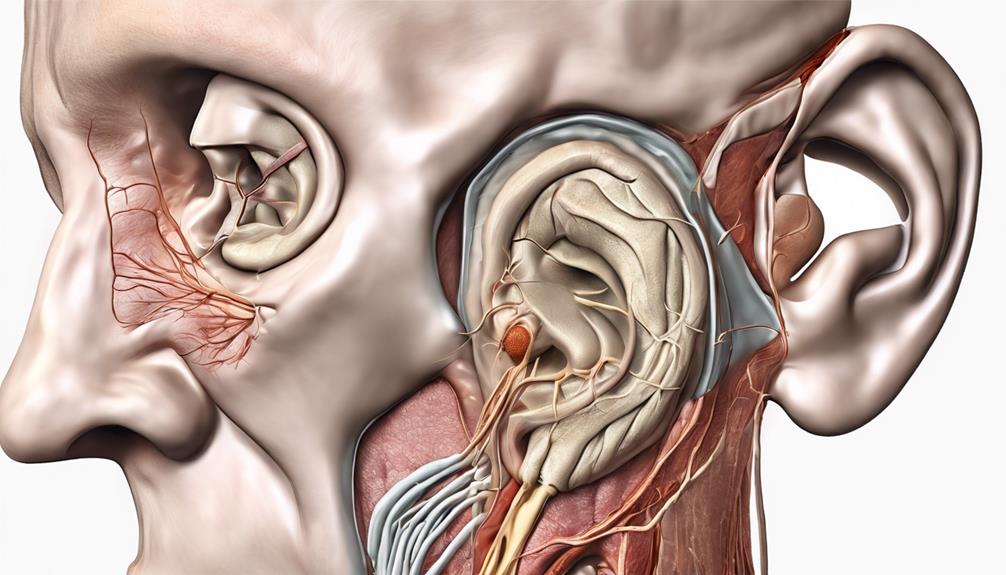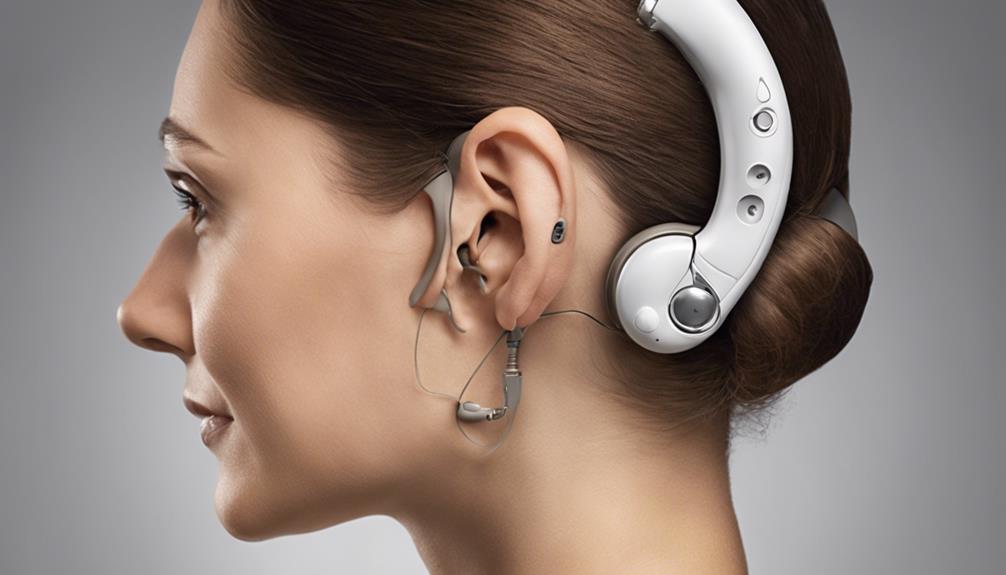For every 1,000 children born, one experiences significant hearing loss in both ears, rendering cochlear implants an essential tool for their growth.
Understanding the impact of these devices on children's lives goes beyond just restoring the ability to hear. By providing access to sound and speech, cochlear implants open up a world of opportunities for children with hearing loss, shaping their ability to communicate effectively and engage fully with their surroundings.
The transformative power of cochlear implants in enabling children to thrive socially and academically is undeniable, making them a vital tool in supporting their journey towards a bright future.
Key Takeaways
- Cochlear implants enhance speech and language skills in children with hearing loss.
- Early implantation leads to better auditory development and cognitive growth.
- Surgery for cochlear implants involves delicate electrode placement and post-operative care.
- Long-term benefits include improved communication, academic success, and overall quality of life.
Benefits of Cochlear Implants for Children
Cochlear implants provide children with profound hearing loss the opportunity to directly stimulate their hearing nerve, bypassing the damaged ear and significantly enhancing their speech understanding and language skills. For children, especially those facing challenges with spoken language due to hearing loss, cochlear implants offer immense benefits. These devices not only improve sound clarity but also enable children to engage in auditory experiences that were previously inaccessible. With cochlear implants, children can learn to distinguish voices, appreciate music, and identify various sounds, ultimately aiding in their overall development and interaction with the environment.
The spoken language development of children with cochlear implants is greatly supported, as these devices allow for a more direct and clear perception of sound. By enhancing their auditory experiences, cochlear implants play a crucial role in enriching the lives of children with hearing loss. The benefits extend beyond just improved speech understanding, reaching into the realm of language skills and social interactions, providing these children with the tools they need to thrive.
Importance of Early Cochlear Implantation

Early intervention through timely implantation in children with severe hearing loss is crucial for fostering improved speech and language development, setting the foundation for enhanced auditory skills and overall cognitive growth. When it comes to the importance of early cochlear implantation, here are some key points to consider:
- Improved Outcomes: Research indicates that children who receive cochlear implants at a younger age demonstrate better outcomes in auditory skills.
- Enhanced Interaction and Learning: Early access to sound through cochlear implants can significantly benefit children, enhancing their ability to interact and learn effectively.
- Development of Crucial Auditory Skills: Early implantation allows children to develop crucial auditory skills, such as identifying loud and soft sounds, during a critical developmental stage.
- Timely Engagement: Timely cochlear implantation enables children to engage more effectively with their environment, promoting overall cognitive and social development.
Considerations for Cochlear Implant Surgery
Considering the significance of a child's journey towards hearing improvement, we navigate the essential factors surrounding cochlear implant surgery with care and expertise.
Cochlear implant surgery for children typically lasts 3 to 6 hours under general anesthesia. During the procedure, electrodes are delicately placed in the cochlea, while the receiver/stimulator is secured to the skull. Though rare, risks like temporary numbness, tinnitus, or balance issues exist.
Following a four-week healing period, children are fitted with an external sound processor, activating the cochlear implant. Regular audiological visits are vital for fine-tuning programming adjustments post-surgery to optimize the child's hearing experience.
This ongoing care ensures that the implant is functioning effectively and that the child is making progress in their journey towards enhanced communication skills. By understanding the intricacies of cochlear implant surgery and its implications for children, we can provide the necessary support for each child's unique hearing needs.
Enhancing Communication Skills With Implants

Understanding the profound impact of implants on enhancing communication skills in children with hearing loss is crucial for their overall development and well-being. When children receive cochlear implants, it opens up a world of possibilities for them to communicate effectively. Here are four key ways in which cochlear implants help enhance communication skills in children:
- Direct Stimulation: Cochlear implants directly stimulate the hearing nerve, allowing children to perceive sound and speech more clearly.
- Improved Speech Understanding: With implants, children can experience better speech understanding, leading to enhanced language skills.
- Spoken Language Development: Cochlear implants enable young children struggling with spoken language due to hearing loss to benefit greatly from improved communication abilities.
- Interpretation of Signals: These implants aid in interpreting electronic signals to the brain, facilitating the development of communication skills in children with hearing loss.
Long-Term Impact on Child's Development
Upon receiving cochlear implants, children with hearing loss experience significant long-term improvements in their overall development and quality of life. Early cochlear implantation is crucial as it leads to better speech and language development outcomes, allowing these children to have language skills on par with their hearing peers.
Research indicates that children with cochlear implants achieve educational milestones comparable to those without hearing loss, highlighting the effectiveness of this intervention. Moreover, cochlear implants enhance social interactions, academic performance, and overall quality of life for children with hearing loss.
By providing access to sound, cochlear implants positively impact a child's future success and integration into mainstream settings. This early intervention not only supports the child's speech and language development but also contributes to their overall well-being and ability to thrive in various environments.
Through cochlear implants, children with hearing loss can experience fulfilling lives and reach their full potential in academic and social spheres.
Frequently Asked Questions
Why Do Children Need Cochlear Implants?
We believe children need cochlear implants because these devices can greatly improve their auditory awareness and language development. By directly stimulating the hearing nerve, cochlear implants provide access to sounds and speech that might be missed with traditional hearing aids.
Early implantation can significantly boost a child's ability to interact with their environment and learn spoken language. Additionally, cochlear implants help children distinguish voices, appreciate music, and recognize various sounds.
How Do Cochlear Implants Benefit Students With Hearing Loss?
Cochlear implants benefit students with hearing loss by providing clearer sound perception and improved language skills. These devices enhance speech understanding and allow students to navigate noisy environments effectively, promoting better communication in classroom settings.
With cochlear implants, students experience a higher quality of life and improved educational outcomes, potentially enabling them to attend mainstream schools. They offer the potential for strong language development, enhancing academic performance and social integration.
Why Are Cochlear Implants Beneficial?
Cochlear implants are essential for children with hearing loss because they provide improved auditory awareness, speech understanding, and language skills. These devices offer better hearing in noisy environments, leading to enhanced quality of life and educational outcomes. They enable children to attend mainstream schools, distinguish voices, appreciate music, and identify sounds.
How Effective Are Cochlear Implants in Restoring Hearing?
Cochlear implants don't restore normal hearing, but they significantly improve the ability to understand spoken language. These devices directly stimulate the hearing nerve, enhancing auditory awareness and language skills.
Children with cochlear implants can achieve language and speech development similar to their hearing peers. Early placement of these implants can profoundly impact a child's ability to interact, learn, and develop essential skills.
Conclusion
In conclusion, cochlear implants are like magic wands for children with hearing loss, transforming their world by opening up the beautiful symphony of sounds around them.
With these miraculous devices, children can't only hear but also speak, learn, and connect with others in ways they never thought possible.
The impact of cochlear implants is truly life-changing, turning silence into a vibrant melody of possibilities for these amazing young individuals.










